A dozen people, half sipping coffee and savoring pastries in Foster Street Coffee in Durham, NC of the American South (part of Turtle Island), half strewn over the continents, gathered around a common hearth of sentipensar, or thinking-feeling (A Escobar). Each year has a theme, but it's not a discrete topic. We poke around and through it, aware that, like most things, it is full of negative or empty space, and can take protean forms. The group is colorful; everyone bears a different discipline, line of activity, complexion, itinerary - aged 20 to 60+. We transgress the academic-lay divide, and are stronger for it. Each week we read, hear, see something, and then come together for 2+ hrs. to toil and play with it. At first, David leads the workshops to set the tone, but soon folx start taking turns moderating or engaging guest discussants. We start with a little personal writing or meditation, then discuss, draw, pause, dissent, and laugh. We record each meeting so anyone can review it. English is lingua franca, but all are invited to think in any language, and broaden, bend our thinking and act with it. The materials are not preset from a syllabus; they emerge as we work, and take their own path and contour. We hold out no deliverable, but move from guiding concepts to exercises of counterdesign. What we discover is that we become what we explore: the common, growth, and so on. We don't jump out of the year ready-made bodhisattvas - just nudged into the long process…
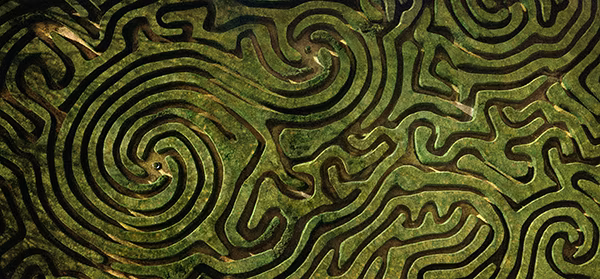
Just as "technology" has been usurped by digitized technology, so current discourse of "intelligence" tends to be hijacked by issues surrounding AI, in turn overshadowing and coopting even the recent flourishing of neuroscience (viz. Neuralinks). This has had a reverse, obscuring effect on larger questions of "intelligence," and given unchecked agency to high tech forces.
growth is not of isolates but a weaving of happenings
In this collaborative Fellowship, we will peel back that current cover, first by tracing various transcultural and -historical framings of "intelligence," then examine how current anglophone constructions relate to them, and how AI as a "sublime" machinic computation might be resituated in this larger (set of) horizon(s) to enable critico-creative engagement with various unfoldings of "intelligence." Enfolded into this protocol will be non-anthropocentric notions of intelligence, extending across species and individuated framings toward webbed and biomic notions and tellings. From there, we will ask how this variegate genealogy and morphology of "intelligence" might activate a new set of conceptual and ecosocial praxes not dictated by the techno-telos of AI-driven "intelligence." Materials to be examined will range from Daoist and Neoconfucian, Helleno-Abrahamic, Indo-Buddhist, Mexica (Aztec) and other "non-Axial" or -theoretical traditions, as well as contemporary anthropology, neuroscience and new media and tech studies. Attention will also be given to the entanglement between intelligence and ethics/ethology, memory, sensoriality, and the political.
Ishaan is a systems-thinking ecologist interested in the poetics and politics of kinship. Crafting meaning in the inbetweenness and straddling distinct worlds have been occupational hazards. He sees social experimentation, playing with risky propositions, and an attunement with the more-than-human world as critical features of his evolving creaturely presence on this planet. While navigating anthropy, Ishaan regulates himself by staring at ceilings and peering into the skies in wonder, smelling foods and textures, and making malfunctioning, old, withering belongings still feel alive.
Aminah describes herself as a Yemeni-American theologian living in an ecology lab, plying the interplay of microbes, humans, religion and the divine. One of theology's grounding convictions, that humans do not exist without God, is sometimes forgotten—but the idea that we don't exist without microbes, has scarcely been thought. To chart new paths, Aminah directs the Symbiotic Theology Project as it rewrites theology in light of humanity's holobiont nature, researches and writes for the Planetary Microbiome Stewardship Project, contributes to NC State's Dunn Lab, and collaborates as a fellow at the Berggruen Institute. She also keeps the home fires burning.
we move like avant-garde dancers
Kath is an artist and gardener with roots in the north woods of Minnesota. They're curious about the experience of time with regards to (rural) living within/attuned to the seasons, durational performance, and resistance to carceral capitalism. If not coming to a complete stop, they'll dally to stretch or even steal time.
Flávia has many friends and loves to nurture her friendships. Born in Brazil, she has also lived in Coimbra, Berlin, Quito, and San Francisco. Now in Canada, she participates in a weekly women's book club. For the past 15 years, she has experienced valuable and transformative learning through body psychotherapy. Previously, she worked as a human rights lawyer. Lately she has been conducting research on Black rural communities that fight for land rights and the protection of Nature in Ecuador. Flávia is currently collaborating on the Decolonial Comparative Law project, coordinated by the Max Planck Institute in Hamburg, Germany.
Saad calls himself a Salik (traveler/seeker) in the Sufi sense. He has a strong interest in the critique of Orientalism, religious and Islamic studies, and the intersections of literature and law. Saad seeks to build bridges between cultural and intellectual worlds through open intellectual dialogue. He has initiated several dialogue projects, such as "Qawlani" (Qawlani.com). Outside of his academic and Arabic teaching roles, Saad enjoys exploring the complexities of Islamic Sufi philosophy, building digital projects, and connecting with people.
Pooja is a wanderer, dreamer, and writer. She lives and breathes stories, and can almost always be found in her local library immersed in the wor(l)ds of Ursula K Le Guin. She studied Philosophy, Politics, and Economics, and has worked at the nexus of climate policy, activism, and research. Currently, she is schemer-coordinator at The Emergence Network and editor at Radical Ecological Democracy. Pooja's life work finds expression in weaving webs of care, running long distances, and seeding practices for multispecies liberatory futures. She is fuelled by lots of caffeine, cat cuddles, and curiosities about the more-than-human kinships.
Ale was born in Tegucigalpa and grew up in Panama City before migrating with her family to Atlanta, Georgia. She is the Chief Editor of Migrant Roots Media, an independent media platform seeking to unearth the root causes of planetary migration. She's driven by a deep desire to serve as a vessel for life-affirming ideas drowning in the world's tumultuous waters. Ale is an Assistant Editor at Duke University Press, where she acquires academic titles in U.S. Latinx history, with special focus on U.S. Latinx social movement history. An experienced union organizer, Ale lives with her pet bunny, Benita.
Mohsen is a poet. Arrested by accident at a protest in 2014, he spent five years in Egyptian prisons, where he completed his bachelor's and wrote his first poetry collection, Mafeesh raqam birudd مفيش رقم بيرد (No One Is on the Line). This won the Sawiris Cultural Award and the Cairo International Book Fair Prize, a kafkaesque paradox marking the absurdity of his journey. He is now writing on identity and exile, subsisting on hope. When depressed, he tries but fails to solve a maths problem. Mohsen loves to travel: "He was a bit incarcerated, but now, he thinks he is free."
Francesc is an urban geographer. Inspired by John Raban's Soft City, he avidly explores hidden dimensions of urban life and culture. Often he takes his students from the Universitat Autònoma de Barcelona out to walk under a highway, experiment with different sounds in the outskirts, or fly in a small plane for an aerial perspective. He works to bring academic discussion to local urban neighborhoods through exhibitions, debates and workshops on the value of places and landscapes. He discusses the digitization of society with his three teenagers, and plays in jam-sessions Friday evenings at the most local bar of Barcelona.
Charlotte is a French-naturalized Taiwanese academic. Since childhood, she has always been navigating between landscapes, social milieux, cultures, languages, academic disciplines. Eventually it landed her at the crossroads of philosophy, mathematics, Sanskrit and Chinese philology, where she has lost any sense of East and West. She felt less lost when her work in developing philosophy education for children and in the history of mathematics in Asia received recognitions.
Michael's guiding life passion has been to understand and live out peace. He loves organizing groups around life-sustaining causes. For 16 years, he did this by building and transforming international NGOs with projects in 20+ countries and now does it through private sector entrepreneurship and advising. If money were no object (and he is currently considering the merits of transplanting free market capitalism with a gift economy), he would be a full-time healer, musician/poet/storyteller, co-farmer with his wife and friends, and foster communities with Mangrovian-esque values and practices while writing books about it with a team.
Dilip da Cunha (ubiquitous wetness) - Arturo Escobar and Michal Osterweil (relationality) - Bruce Lawrence (Ibn Khaldun's historic cycles) - Daniel Richter (critical zone science) - Antonio Tamburrino (Carless Rome)
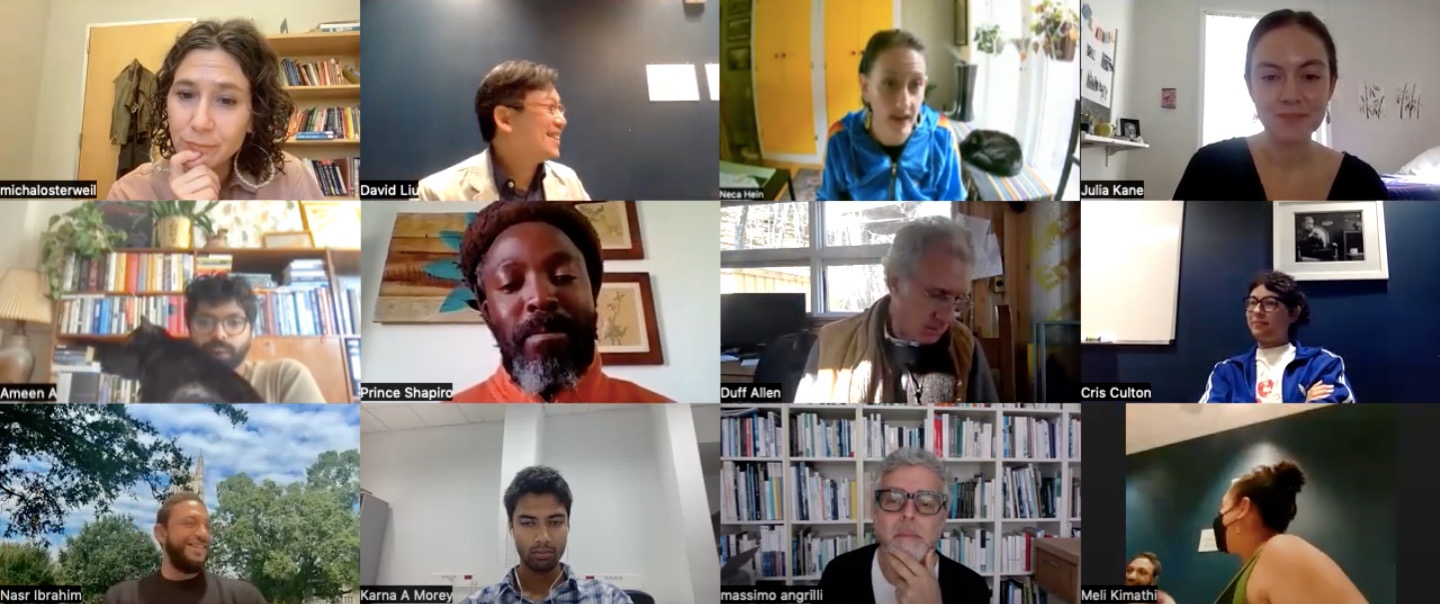
Having plumbed "the common" against the anthropocentric grain in our inaugural Fellowship, we stepped into the maze-forest of "growth" with these curvatures: the pluriverse, the "transverse," and the "perverse" [PURR-verse]. What, you say? While preglobal worldings have projected cosmoi of their own, a scientized neo-empire has imposed its universe on all others under the guise of objective, not just conventional, reality. The pluriverse ensures the continuance of distinct, even resistant, worldings. The partial connections between them permit give-and-take, yet the power dynamics also forbid fair play or real delinkage (Mignolo). The transverse is our way to slide between them and take up, not an othering of worldings, but an othering of one's own sufficient to negotiate "otherly" realities. Still, even this transversal can reify, detemporalize, indeed underpower each common lifing - or "co-lifing" over transoms. Enter the perverse. Rather than reducing to a Deist minimum (Cherbury) for a new universal, we proposed a perversal platform where the evolving interactions of the pluriverse and its transversals can also spawn multilaterally translated, sharable commons allowing at once evolving diverging and convergence. We mean this beyond a human focus. With this macromicro differentiality and "posthumanist" imaginary, we could now begin to think "growth" in its myriad embodiments - even inversions, eversions, reversions...
growth is not of isolates but a weaving of happenings
Stage set, we slid into V Smil's survey of "growth." As a universalist account under scientific scope, it deployed a metron for all material reality: from the cell to megacities under one lens, with patterned vertical climbs: linear, logarithmic, exponential. Rimming scientific consensus, Smil warns of peaks and limits of growth. But what of incommensurate ways of describing, living the world? Can a non-lizard do the sentipensar for a lizard? In his monoscoping, Smil owes much to the breathtaking correlations of A von Humboldt across the continents he traversed, but also assumes the All that Humboldt globalized of Hegel's (imperializing) Hellenic universal. We asked: Can difference in kind be corralled numerically without requalification or translation? Leaving such a platform of "growth," we plied our own translinguistic query. With over two dozen tongues among us, we uncovered abundant construals of "growth": lengthening, enlarging, stretching, opening, greening, unfurling, blowing up... Of the last, we also plied the Greek physis on R Williams' relook at "nature," derived as it was from that Greek term but denatured by modern science.

Retaking an ampler sense of growth, we turned to the striking insights of Laozi, Nagarjuna, and Qohelet, who articulated processes in terms of radical contingency, emergence, and metabolic recursion. We saw the latter (with B Lawrence's help) in Ibn Khaldun's dynastic phases where, within each phase of civilizational growth and social cohesion, there was also degrowth or attrition, atrophy. The Chinese painting "Up the River at Qingming" pictorialized this complex irony: At the peak of prosperity was already decline, decadence - peril. But growth is not only socioeconomic, as we gleaned from the Rhenish Hildegard, Kimmerer's Potawatomi plains, and sex pots of the pre-Columbian Moche elite. It is also spiritual, ecological, social - in sum, relational. A Escobar and M Osterweil reminded us (in person) of the abyssal import of that awareness, as did mycopunkerie, Kropotkin's (and Wu-Tang Clan's) mutual aid, along with Illich's conviviality - a sort of mutual growth like ubuntu. Others pointed at useless or noxious growth (Marx, Graeber, Bregman). The relationality of growth became sobering as we considered "operational land" (cum air and sea), where cities subsist on their far-reaching command-control, and D Richter's plurimodal critical zone science. Such vantages gave us caveats to thinking through current plights of housing and dwelling, as well as a wide lens from which to approach D da Cunha's protean concept of ubiquitous wetness and A Tamburrino's Carless Rome project, an attempt to transmobilize - thus recondition - Rome.
Having blown through the vertiginous whirlwind with "growth" in both theoretic and pragmatic terms, we now find ourselves in a new clearing, a calm meadow of "useless" fruition. This mirrors the useful blurring that characterized our earlier toil on "the common," and points a way out of the chokehold of relentless (economic) growth and "progress." Maybe with this release, growth could now be renatured if not rewilded, allowed to go its thousand woven ways.
Ameen Ahmed is a curator, artist, writer, and researcher from Bangalore, India, and Toronto, Canada. His current research interests revolve around "magic", which he describes as the use of the rhetoric and methods of religion and myth by political and corporate agents of "progress" and "development". This is part of a larger interest in stories and storytelling, whether those stories are disseminated through media, or through visual, political, or architectural means.
we move like avant-garde dancers
Duff Allen is a writer living in upstate New York. His work is driven by an underlying and indomitable happy despair that regards storytelling as the light seen through the keyhole, even if the door is quite heavy and bolted shut. He teaches writing at Bard College.
Architect and PhD, he studied at the Architecture Faculties of Pescara and Paris-Tolbiac, he received a PhD in Urbanism at the Inter-university Doctorate of Rome-Pescara in 2000, with a thesis entitled "Green Urban Network", with landscape architect Michael Hough (University of Toronto) as external tutor. He is Professor in Urban Design at the Architecture Department of Pescara. He taught as visiting professor in the International Masters Degree "Landscape Intervention and Heritage Management", Universitat Autonoma de Barcelona. Author, among others, of the books "Piano Progetto Paesaggio. Urbanistica e recupero del bene comune" (with a postfazione by Francesc Munoz); "Reti verdi urbane", (with a preface by Michael Hough), author of papers published in national and international scientific magazines.
Cris takes an artistic-historical approach in thinking about how we create knowledge. Originally from Los Angeles, they attended UC Santa Cruz, earning a degree in history. Now a PhD Student at Duke, Cris enjoys working with students and researchers in thinking about the impact that mental and physical travel has in the shaping of culture. Cris is fascinated with the power that poetry, art, music, and the beach have in moving our world.
I am a born and raised east coast HipHop head and educational anthropologist. My son is undoubtedly my greatest love. Music is my vitality and culture is my universe. I have a deep passion for both philosophy and quantum physics, and the two together constitute my personal sense of spirituality. Currently, I am an adjunct professor of education at DePaul University and of sociology and anthropology at St. Xavier University in Chicago, Illinois. Always on the lookout for the most information I can get my hands on and the widest variety of experiences one could engage in, I am constantly seeking growth of mind, body, and soul.
Mr. Nasr Ibrahim has ten years of experience in financial evaluation, commercial banking, loan guarantee schemes, access to finance, women's economic empowerment, entrepreneurship training, and monitoring and evaluation. He has worked with national and international development organizations, European and United States government entities, Development Financial Institutions, and non-governmental organizations. He is a financial consultant for a KfW development bank-funded program for Investment for Employment in nine African countries. He is a graduate student at Duke University's Sanford School of Public Policy pursuing a master's degree in International Development Policy with a concentration on economic growth and social innovation. He is currently a graduate assistant for the MIDP admissions team and a MIDP student ambassador at Duke University.
Meli Kimathi labors at the intersections of race, gender, and culture to activate wisdom, words, and ways for community solidarity. Broadly interested in mental health maintenance via personal musical practices and praxes of palliative care for our dying master narratives, she holds degrees in International Studies, Education, Social Work. Her doctorate is forthcoming from UNC-Chapel Hill, where her engaged scholarship explores the healing work of DJs through African diaspora music in live party spaces.
Karna Morey is a physicist, with expertise in both astrophysics and condensed matter physics. He is broadly interested in interdisciplinary research methods in theoretical and experimental physics, especially projects that use statistics and data analysis to work at the intersection of the two. He is also passionate about anti-racism and feminism within academia and the broader world, and has been involved in a number of diversity, equity, and inclusion initiatives (DEI). He is currently working at the University of Barcelona as a visiting researcher. Outside of physics, Karna enjoys running, classical guitar, cooking, and hiking!
Oladosu Adenike Titilope is the founder of I Lead Climate Action Initiative that advocate for the restoration of Lake Chad and a green democracy. She specializes in peace, security and equality in Africa especially the Lake Chad region. Adenike is passionate about youth involvement in climate action through climate education. She's the recipient of the Ambassador of Conscience award by Amnesty International Nigeria. Adenike has showcased her climate action in both international, national and local fora. She has empowered thousands of women through her initiative of giving women and girls access to the use and control of resources.
Michal teaches in the Curriculum in Global Studies at UNC Chapel Hill. She believes that learning how to live into a resilient future requires a pedagogy that considers theory, history, and philosophy as well as more practical, spiritual and embodied knowledges and practices. Michal is a mother and radical homemaker who loves making (collective) life through gardening, cooking & feeding others, making tea blends and medicinal concoctions, and generally de-commodifying life! She's recently been training in various healing modalities and embodiment practices, seeking to integrate them into her teaching.
A Mangrovian 22-23 Cultural Activist, working at Page Seed as an assembler of seed orders for American growers, the State, and her neighbors. His progression in life is and has always been about the becoming. He believes in platforms serving mankind with inspiration for human development. Grateful to learn…
Roxana Bendezú (migrant experience/media) - Chiara Klein (community fisheries) - Bruce Lawrence (Islamicate cosmopolitanism) - Lissa McCullough (Soleri's arcology) - Stuart Pimm (bioconservation)
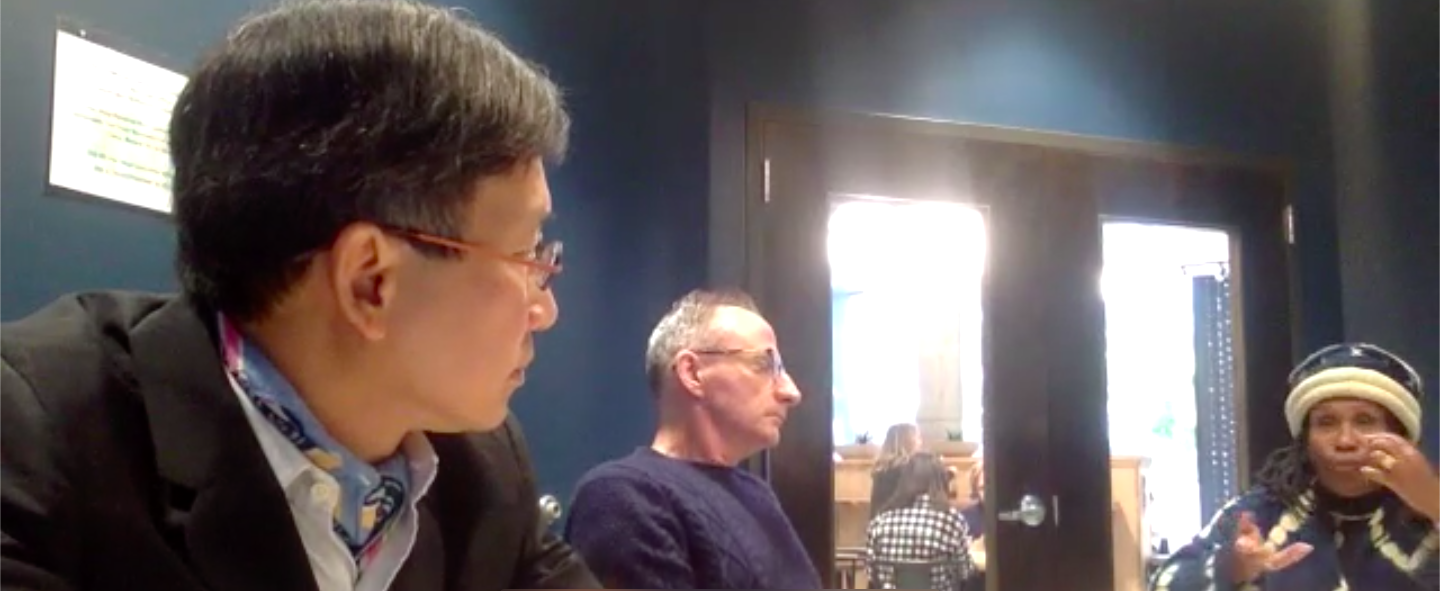
the common is not the commons
Our dauntless cohort unwound these terms by imagining the common as a webbing of encounters: dealings of any kind between forms or processes, worldviews and ideologies, and stories and methodologies. Here the common is as manifest in the gut biome of a cow as it is in the heat of political negotiation, in an engine or in caves, around creek and the rock, as it is in spirit - none of which need be a common for us. So, we faced the question: where the common ends and the uncommon begins.
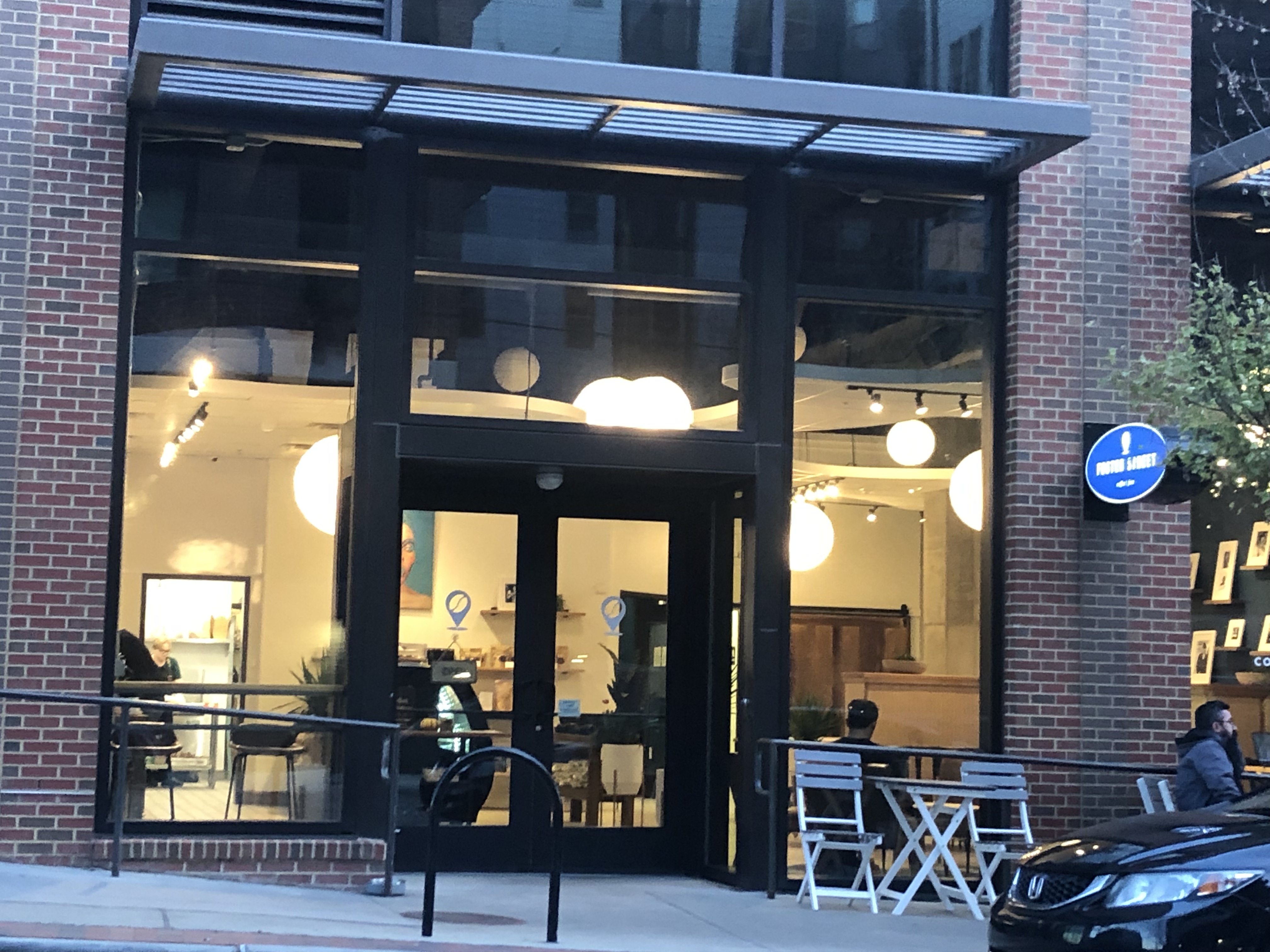
It also became necessary to sniff out where the common has faced erasure due to hierarchical assignations, particularly those pitting knowledges and worldings against each other in such a way that the uncommon evinces a violent force. There, the common can also emerge a force of erasure, mushing difference into a purée of the "universal."
We looked to Arturo Escobar's weaving of the "pluriverse" as an alternative framing of knowledge to the tyrannical centrifuge of global development. Moving from this flight from the universal, we began to seek not only the cohabitation of multiform truths and lifeways, but also how they can dance with each other - and allow traversal between them. We read origin stories from around the world, asking what is common and uncommon in and between them, and how those dis/junctions are born of the biomic commons such stories poke out of.
Keeping taut the tension between the common and commonable, the cohort swung through disciplines and scales, feeling shared ideas morph and lose their (re)cognizability. We looked to American cities and the work of Jane Jacobs, to the uncommon in our own spirits through Gloria Anzaldua's writing, to biodiversity and human positions in it, and to life- and spiritways, art, and ideas of the good life. Without reaching explicit ends or points of production, the Fellowship steadily became a practice of making a common of itself. Fellows, each with peculiar perspectives shaped by history, legacy, place, and self, met the others in uncommon commonness, practicing the art of mutual creation, agreement, disagreement, and listening. This became a touchstone to imagining other uncommon commons - even beyond human worldings.
In the second half of our meetings, we were lucky to welcome guest discussants on community fisheries (C Klein), migration (R Bendezú), bioconservation (S Pimm), Islamicate Cosmopolitanism (B Lawrence), arcology (L McCullough), and to honor the specific skills brought by Fellows through the co-creation of our inquiry and the release of central leadership. This led us to points inconceivable at the start of the year, including collective musical improv held over Zoom, musings over broken rules and physics, multilinguistic exercises, and ever emergent and unexpected writing. Gradually, focus shifted to the question of how Fellows might seed the co-generation and cultivation of commoning practices tailored to local contexts, where the players also extend beyond humans. In the end, we both hoped to keep exploring such a process beyond our year together, and to see the year's work continue in future cohorts and projects with the inklings that keep blinking.
Andalusianist, Amer-African Visionary and Educator
Afrocentric Educator
Classicist and Technical Architect
Student in Environmental Humanities, '23
Flutist
Latin American Historian
Youth Climate Leader and Statistician
Architect
Visual Artist and Creative Placemaker
Composer and Multimedia Artist
Engineer, Musician, and Teacher
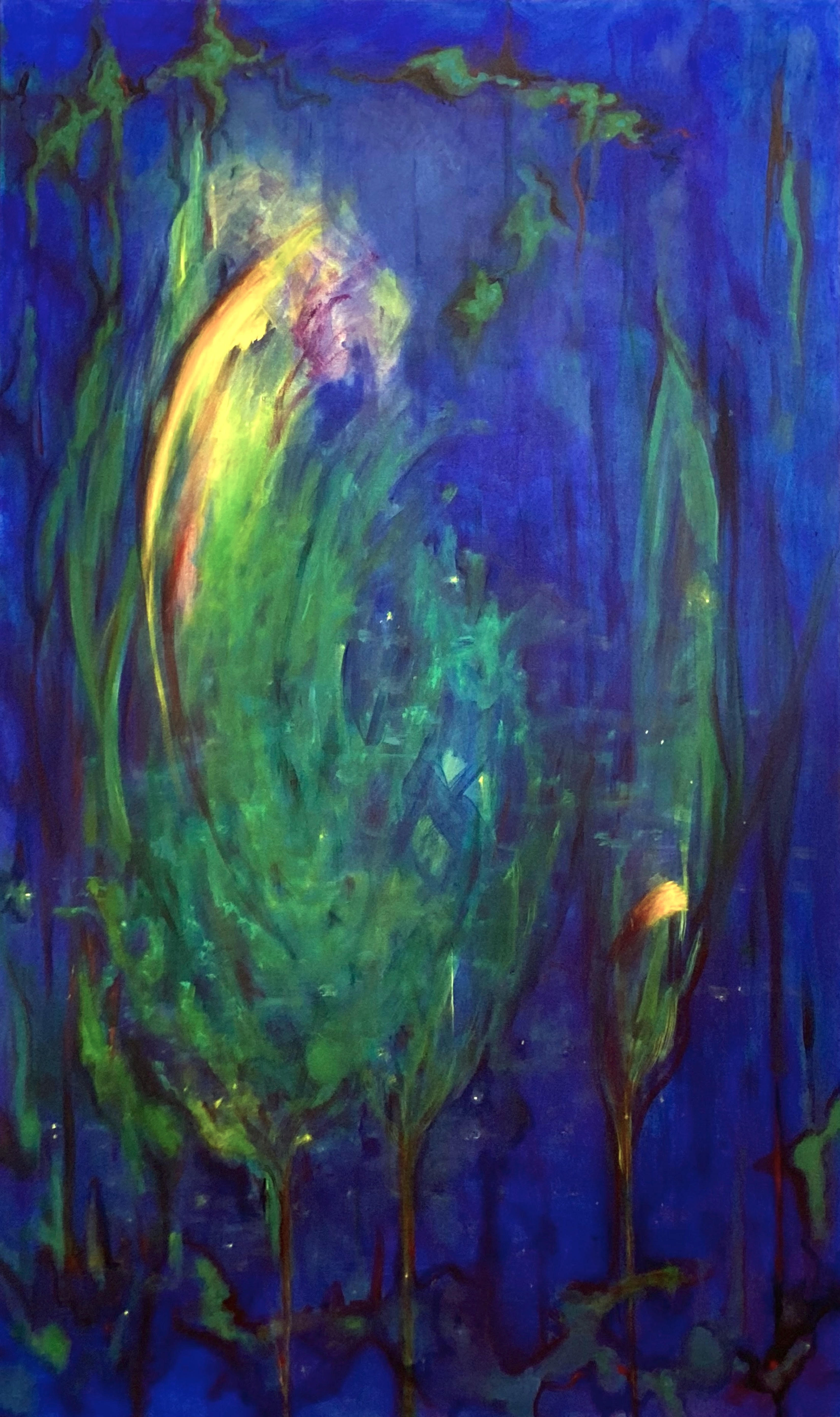
Painting by Deborah Patterson, used by permission
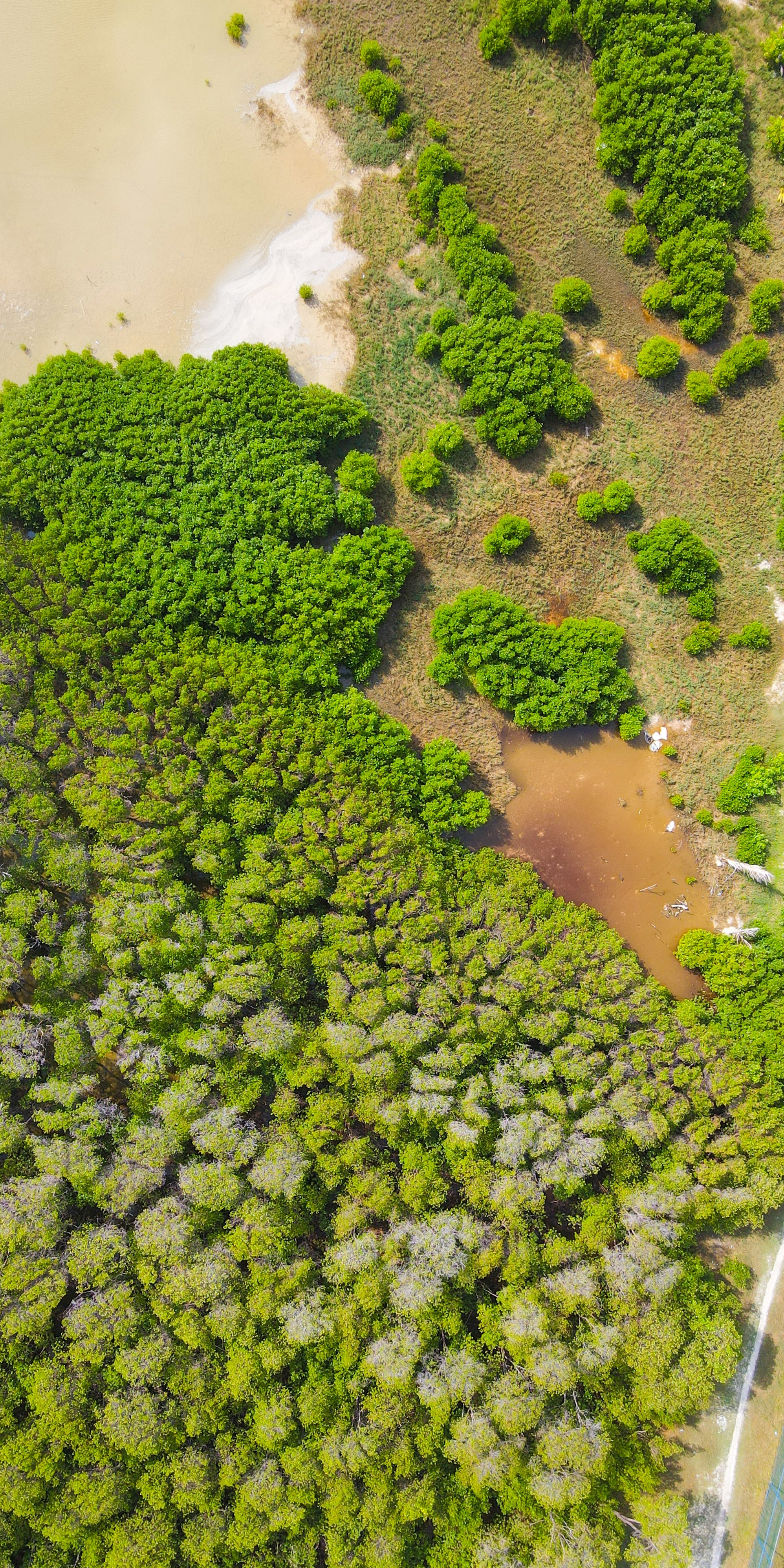
Mohamed Ibrahim
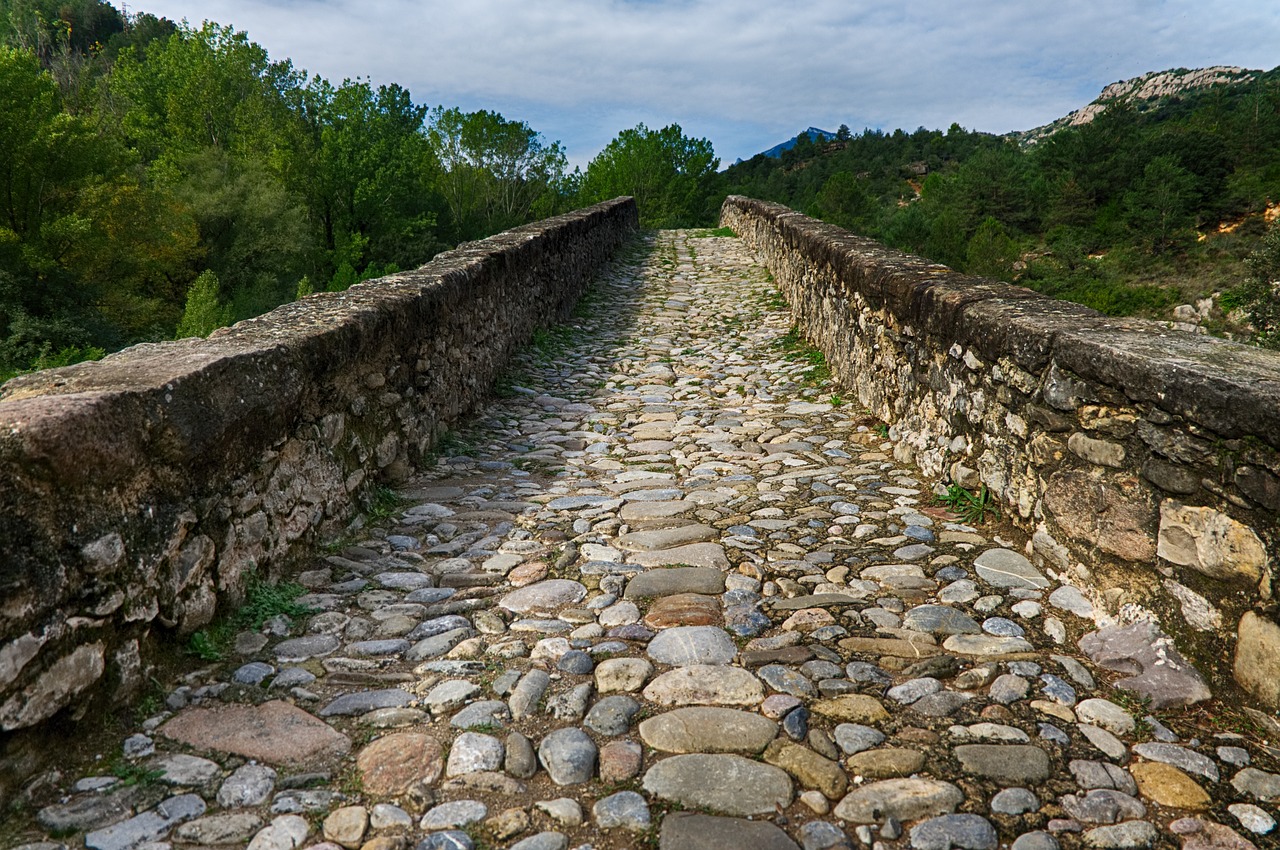
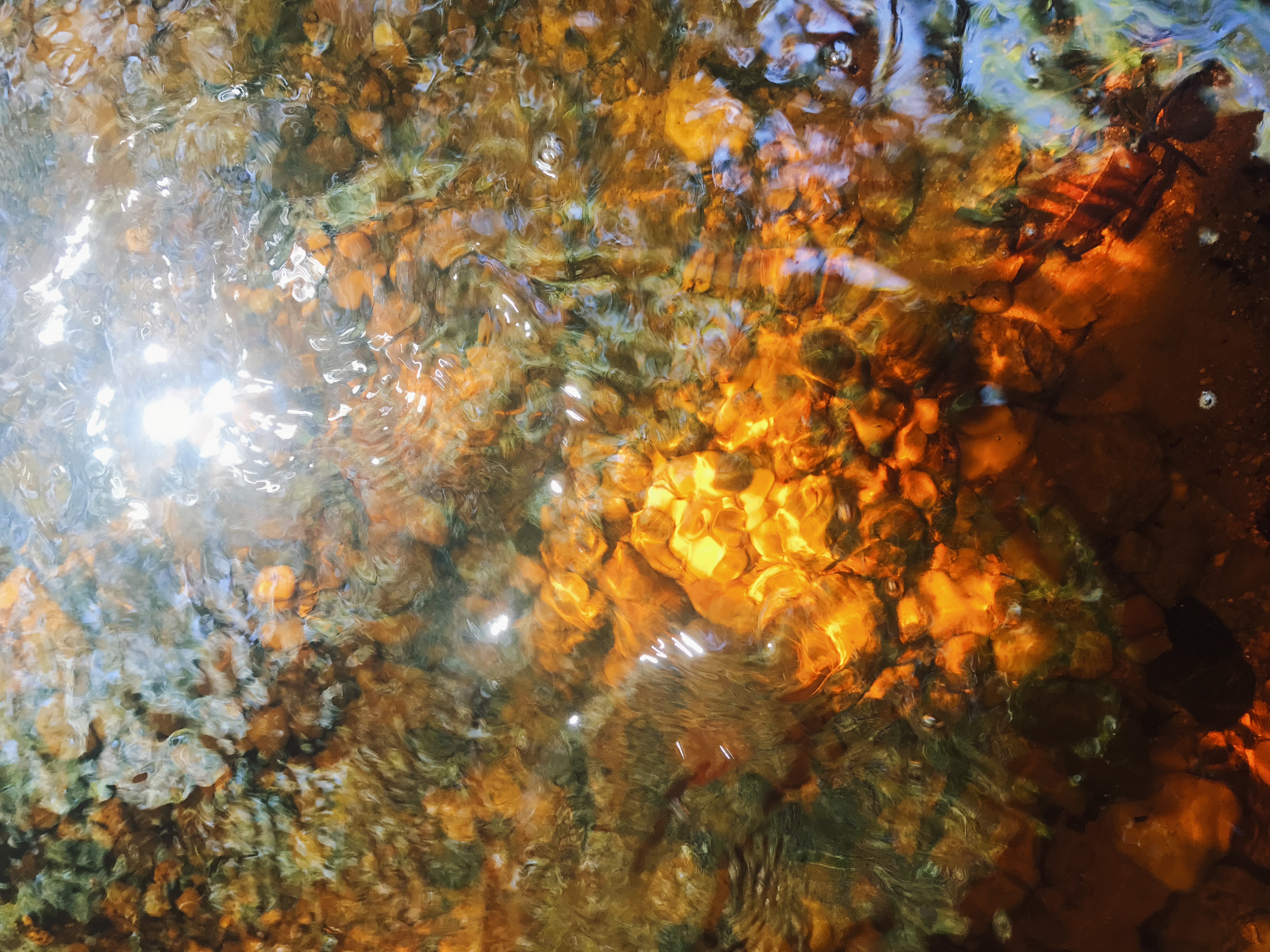
Compared with my pre-Mangroves self, I conceive human society more as a lovely artifact, correctly material and consequently malleable.... I think I better appreciate the continuity of natural and artificial growth and making. Thanks to our fellowship, I keep wanting to apply extended ecological imaginings.
I have learned to interrogate the root of words as a means to show their non universal meaning… Above perhaps any other single "concept", "relationality" is the one that has most impacted my understanding and approach to everything else. I have throughout the year found myself thinking about topics in my learning and teaching through the lens of their meaning as acquired from their relational subject/object. The philosophical readings from the beginning of the year were excellent starting points for me to see things this way because they highlighted how across different cultures, time-periods, geographies, etc, one fundamental (if we might) aspect of life-processes is the movement between thoughts, beings, designs, realities, etc. Because of this philosophical foundation it both became more 'legitimate' to then move onto contemporary issues, but also served as a most important frame of reference.
The Mangroves environment, so rich in diverse experiences and interests, has also, I think, offered me emotional and psychological growth. I have verified in these months on myself a development of emotional intelligence, self-awareness, empathy and interpersonal skills. Another thing Mangroves taught me is that adopting an inter- and transdisciplinary approach allows for the recognition of the interconnectedness and complexity of growth, highlighting the need to collaborate and integrate knowledge in various fields to promote comprehensive and sustainable development, overcoming with a periblematic approach the problem-solution habitus that characterizes our age.
The more one embraces commonality in an individualistic context, the more uncommon one becomes by virtue of gaining insights into matters unengaged by the milieu.
During the months of this fellowship, I've thought many times about what constitutes a "common". My instinct initially was to see the commons in a purely materialist sense; the land, the resources, the ecosystems, etc. Working in parallel on my master's thesis and this fellowship made me realize the importance of our "imaginary commons", such as our founding myths and stories… In every interaction, every presentation, every project that tries to make an impact on the world, I will now ask: what story is this trying to tell me? What meaning does it try to convey and which underlying assumptions does it make use of? I will also consider whether or not such a piece of storytelling is creating a new common where actors (human and non-human) can connect and interact as equals, and whether this will serve our future common good.
This experience has encouraged me to lend my voice and experience to future groups/assemblages intent on posing complex questions and working out collaborative responses in innovative ways… not necessarily toward a specific end point.
We must understand that we all have points of entry into conversations based on our personal experiences and knowledge. Therefore, the Mangroves Fellowship encourages everyone to participate and share their thoughts.
Notable moment: early on when I realized we had jettisoned many familiar frameworks and had begun to feel our way like modern dancers or avant-garde composers through new kinds of thinking.